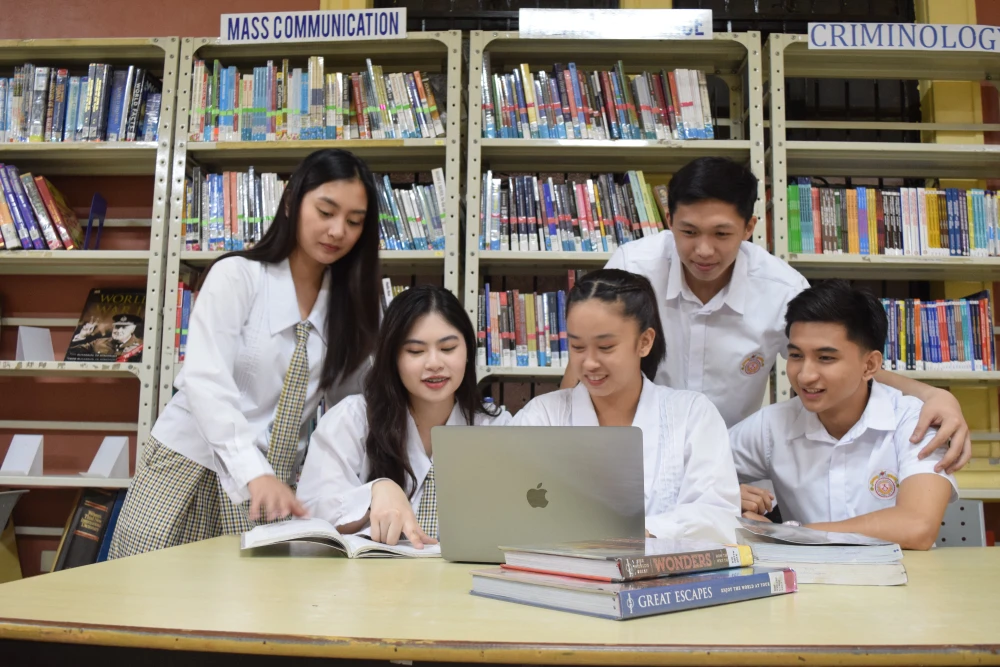Description
Formerly, the High School Department of SSC-R, Manila was an exclusive school for male students then in 1986, it began to admit the female students. It made SSC-R, Manila completely co-educational in all departments.
The neo-gothic edifice of St. Ezekiel Moreno Building was built in 1958, previously known as the High School Building. It featured the era’s finest auditorium- one of the city’s best with projectors, revolving stage and state of the art facilities. The auditorium (seating capacity- 1,200) serves as a venue for college activities. It is available to the public for various affairs. The St. Ezekiel Moreno Chapel is conveniently located at the ground floor of the building. The building is named after St. Ezekiel, patron of cancer patients and the patron saint of the Augustinian Recollects of the Philippine Province, while the auditorium is offered to Fr. Diego Cera, OAR, the ingenious mind behind the famous Bamboo Organ of the Las Piñas Parish Church.
Today, the Junior High School boosts its spacious and fully air-conditioned classrooms equipped with projectors, bulletin boards and steel lockers for students. It also exhibits the Library, Instructional Media Center (IMC), Audio-Visual Room (AVR), Conference Room, three (3) science laboratories, three (3) computer laboratories, Home Economics, P.E. Room, MAPEH Room, Scouting Room, Satellite Clinic and the office of the Supreme Student Government (SSG). The spacious school canteen is found at St. Monica Building while the fully equipped medical/dental clinic with licensed physician, dentists and nurses trained especially in school emergencies, is found at the annex of the Administrative Building.
Incorporating the social outreach program, SCDEO (Sebastinian Community Development and Extension Office) formerly SOFI on May 2004, has allowed the employees (teaching and non-teaching personnel) and students to participate in the community building activities. Seminars, distribution of goods, financial support and spiritual programs are extended to orphanages, charitable institutions, local government units and other parishes. It has introduced sustainable and long term community programs to its adopted barangays to help residents become self-reliant and the community self-sufficient.
Students of the JHS have given the school honor and prestige through their remarkable success in off-campus competitions and excellent demonstrations in other co-curricular and extra-curricular activities. In sports, SSC-R, Manila has established commendable NCAA records and championships in basketball, volleyball, chess, swimming and track and field in the Junior Division.
The Junior High School Department enjoys the Level III Accreditation from the Philippine Accrediting Agency of Schools, Colleges, and Universities (PAASCU) since 2009 and still vows to continue fulfilling the school’s mission, vision and its objectives for the greater glory of God and for the Filipinos beyond the 21st century.
We commit to provide Quality Catholic Christian Education for the holistic formation of every person to become socially responsible, morally upright, academically and technologically competent leaders and professionals ready to meet the needs and demands of the local and global communities.
Objectives of the SSC-R Junior High School Department
- to inculcate in the minds of the students the spiritual and moral values, making them responsible persons who see God as the source of moral obligation, and who accept Jesus Christ as True God, Master and Savior;
- to assist the students to achieve responsible leadership and social commitment based on the Catholic Christian principles and the Augustinian Recollect ideals;
- to provide relevant and meaningful activities in the school community where students are at home with God in their service to others especially the weak and the needy, and at home with Mary, their comfort and joy in their restless journey;
- to help the students in the choice of a career and pursue a plan suitable to their skills, aptitudes, intelligence, interests, abilities and personality;
- to give our Filipino youth a quality education that can distinguish them from others who are in search for new knowledge applied to Philippine realities;
- to develop the students’ skill to think with objectivity, open mindedness and intellectual honesty in the discussion of issues within the context of social sciences;
- to assist the students in evaluating themselves so that they can embrace the range and quality of their participation in solving the family, community, national and international problems, resulting in the person’s commitment to moral and socio-economic development:
to create among students and the school community a conscience of national identity in order for them to contribute to the acceleration and realization of the country’s economic and social goals; - to improve the students’ self-expression in the Filipino language for a better appreciation of our cultural heritage, thus strengthening the nationalistic spirit.
- to aid the students to gain proficiency in the use of the English language in order to develop a deeper appreciation of the vast range of human experience from the wealth of literary materials which will help them concretize their self-values, ideals and standards to serve as basis for social conduct.
- to provide the students with a clear understanding of the simple concepts of space, time, matter, motion, force and energy so that they may understand and appreciate common phenomena and perform basic laboratory skills and apply this knowledge in solving relevant problems not only in the school but also at home and the community settings;
- to clear the students’ understanding about the interrelationship of all living things in the biological community and apply biological principles for the betterment of life and the improvement of the ecological settings;
- to provide the students with concepts and major theories so that they can recognize mathematical relationships and perform fundamental operations, thereby gain the skill of deductive reasoning through discovery and analysis;
- to foster the principle of “a sound mind in a sound body” and raise the students’ level of competency and effectiveness in varied sports activities where they form the values of cooperation, courtesy, obedience, fair play and sportsmanship;
- to implement a computer technological course so that students can use these tools and be aware of the effects they will have on their lives and recognize their impact in the society; and
to provide the students the initial knowledge in the different studies of practical arts and other arts activities that will develop their creative talents and skills.
Accreditation
Level III Re-Accredited Status (May 24, 2019 – 2024)
| Type of Visit | Date of Survey | Action Taken | Validity |
|---|---|---|---|
| Preliminary Visit | August 12 – 13, 1991 | Consultancy Visit | No less than 1 year |
| Consultancy Visit | August 31, 1994 | Ready for the First Formal Visit | No less than 1 year |
| First Formal Visit | August 24 – 25, 1995 | Accreditation for a period of 3 years | 1999 |
| 1st Resurvey Visit | February 8 – 9, 1999 | Re-accreditation for a period of 5 years | 2004 |
| 2nd Resurvey Visit | August 4 – 5 , 2004 | Re-accreditation for a period of 5 years | 2009 |
| 3rd Resurvey Visit | March 2 – 3, 2009 | Re-accreditation for a period of 5 years | 2014 |
| Application for Level III Accreditation | Sept. 2009 | Granted Level III Accreditation | Dec. 2009 |
| Resurvey Visit | February 20-21, 2014 | Granted Level III Re-accreditation | May 2014 |
| Resurvey Visit | February 21-22, 2019 | Granted Level III Re-accreditation | May 2024 |
Contact details
- 09614428988 (Principal’s Office)
- 87348931 to 39
-
Local Numbers
306 Principal’s Office
304 Coordinator for Academic Affairs
317 Coordinator for Student Affairs
319 Faculty Room
315 IMC
316 Science Laboratory
318 Computer Laboratory
307 Library
308 Guidance Office -
Principal Office: hs@sscrmnl.edu.ph
Guidance Office: juniorhighschool@sscrmnl.edu.ph





